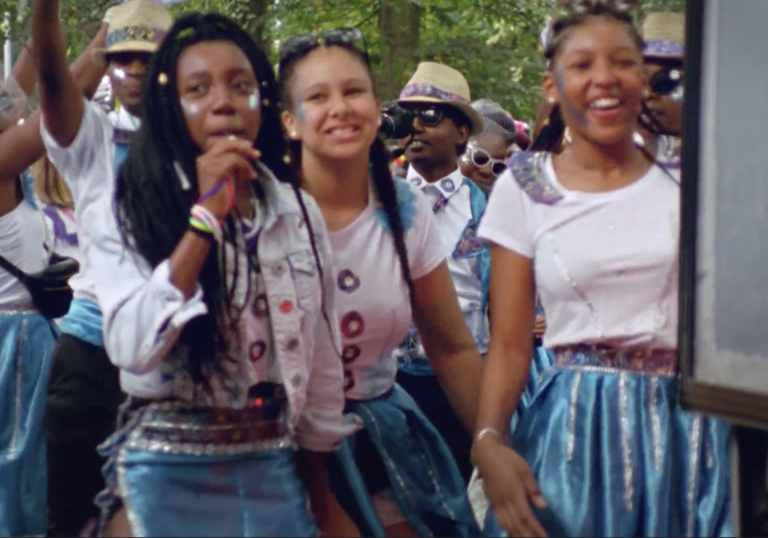The Devil Finds Work: Shorts programme (15*) + ScreenTalk with Ayo Akingbade and Rhea Storr, hosted by Ellen E Jones
James Baldwin on Film

A selection of British short films that interacts and intersects with the ideas in James Baldwin's Essay The Devil Finds Work.
This programme of short films made by contemporary British film and moving image artists converses with the ideas James Baldwin presented around Black representation on screen, bringing this seminal text to a modern context.
These films by contemporary moving image artists Ayo Akingbade and Rhea Storr look at housing, protest and celebration in order to pose and respond to questions about community, belonging and identity.
This is a past event. Subscribe to our newsletters to hear about upcoming events
Booking fees
£1.50 booking fee per online/phone transaction.
No fee when tickets are booked in person.
Booking fees are per transaction and not per ticket. If your booking contains several events the highest booking fee will apply. The booking fee may be reduced on certain events. Members do not pay booking fees.
Programme
Films by Ayo Akingbade:
Dear Babylon
HD video, colour, sound, 21 min
The future of social housing is threatened by the AC30 Housing Bill. Set in London’s East End, a trio of art students are eager to raise awareness about their neighbourhood, especially the lives of tenants and people who work on the estate.
So They Say
Super 16mm transferred to HD file, colour, sound, 11 min
Set in 1985 and the present day, the film explores and reflects on the often forgotten histories of the Afro-Caribbean and South Asian community struggle in East London. The legacy of community and activist group, Newham Monitoring Project is spotlighted.
Fire in my Belly
HD video, colour, sound, 11 min
A necessary youthful take echoing on questions of home, community and crisis in the metropolitan city of London.
Films by Rhea Storr:
Junkanoo Talk
2017, UK, Digital and Super 16mm converted to digital with sound, 12min, (excerpt)
Junkanoo Talk investigates the language of celebration through carnival. It employs the techniques of costume crafting particular to Junkanoo- a carnival of the Bahamas. The sound is produced on the body and takes the rhythms of Rake 'n' Scrape music, also particular to the Bahamas. James Baldwin is quoted, speaking of the complexities of being an African American living in France, along with the Bahamian Tourism Minister who speaks of appropriation and the body as a voice. Authored by an artist of mixed race, Junkanoo Talk questions the slippages which occur when a language performs across cultures, asking what can be translated and where resistances occur.
A Protest, A Celebration, A Mixed Message
2018, UK, Super 16mm converted to digital with sound, 12min, (excerpt)
Celebration is protest at Leeds West Indian Carnival. A look at forms of authority, 'A Protest, A Celebration, A Mixed Message' asks who is really performing. Following Mama Dread's, a troupe whose carnival theme is Caribbean immigration to the UK, we are asked to consider the visibility of black bodies, particularly in rural spaces.
This project is part of the ‘James Baldwin and Britain’ project (2024-2027), led by Douglas Field, Kennetta Hammond Perry and Rob Waters, with thanks for the generous support by the Arts and Humanities Research Council.
The film programme is curated by Dr Clive Chijioke Nwonka.
Biographies
Ayo Akingbade is an artist, writer and director. She trained at the London College of Communication and the Royal Academy Schools. Ayo’s short form documentary work has been spotlighted on MUBI & The Criterion Channel. JITTERBUG, which explores displacement in increasingly gentrified Hackney, represents Ayo’s transition into narrative storytelling, and was selected as part of Directors’ Fortnight at the Cannes Film Festival 2022. Her short FALUYI, shot in Nigeria, explores themes of familial legacy and mysticism. Her most recent short KEEP LOOKING, filmed in New York, will hit the festival circuit in 2024. She is currently developing her debut feature with BFI backing. Ayo likes to explore character and the nuances of human interaction and subject matters rooted in the social and political structures that dominate today’s society. She was 2022 Screen Daily Star of Tomorrow.
Rhea Storr is an artist filmmaker who explores the representation of Black and mixed-race cultures. She is a co-director of not nowhere an artists’ film co-operative, London, that has a particular focus on analogue film. She is resident at Somerset House, London and is the winner of the Aesthetica Art Prize 2020 and the inaugural Louis Le Prince Experimental Film Prize.
Ellen E Jones is a journalist, broadcaster and author of Screen Deep: How Film and TV Can Solve Racism and Save the World (Faber, 2024). She is the co-host of BBC Radio 4’s Screenshot, the host of the Barbican’s ScreenTalks podcast and writes regularly on film and television for The Guardian, Empire, Elle, Esquire and others. She was formerly a weekly current affairs columnist at the Evening Standard and The Independent on Sunday, and the resident critic for BBC One’s flagship Film programme
Give a year of art, music, film and theatre
Cinema 2
Location
Barbican Cinema 1 is located within the main Barbican building on Level -2. Head to Level G and walk towards the Lakeside Terrace where you’ll find stairs and lifts to take you down to the venue floor.
Address
Barbican Centre
Silk Street, London
EC2Y 8DS
Public transport
The Barbican is widely accessible by bus, tube, train and by foot or bicycle. Plan your journey and find more route information in ‘Your Visit’ or book your car parking space in advance.
Location
Barbican Cinema 2 & 3 are located on Beech Street, a short walk from the Barbican’s Silk Street entrance. From Silk Street, you’ll see a zebra crossing that will take you over the road to the venue.
Address
Beech Street, London
EC2Y 8DS
Nearby public transport
We are within walking distance from a number of London Underground stations, the closest being Barbican, St Paul’s and Moorgate. The nearest train stations are Liverpool Street and Farringdon. Bus Route 153 runs directly past the Barbican along Chiswell Street
Car and bicycle parking
We have free bicycle spaces and paid car parking spaces available
We’ve plenty of places for you to relax and replenish, from coffee and cake to wood-fired pizzas and full pre-theatre menus
Access
Level access from the Pit floor foyer only to the two boxes (see Mobility below). All other seats lead off stepped aisles.
Mobility
Two boxes at the rear of the auditorium each have space for one wheelchair user and a companion. Please book early and ask for these seats.
Assistance dogs
Assistance dogs may be taken into the cinema – please tell us when booking, to ensure your seat has enough space. If you prefer, you may leave your dog with a member of the foyer staff during the performance.
Hearing facility
There is an induction loop in the auditorium. You can use this by adjusting your hearing aid to the ‘T’ setting.
For more access information, please visit our Accessibility section.
Access
Cinemas 2 & 3 are located at Beech Street, a short walk from the Barbican Centre’s main Silk Street entrance. There are a couple of steep, dropped kerbs and an incline to negotiate between the two sites. Level access from Beech Street.
Mobility
Each auditorium has three permanent wheelchair spaces (two in the third row and one in the front row) and 153 fixed seats with capacity for a further three spaces in the front row. Access to each auditorium is up a ramp. There are also a number of seats with step-free access.
Assistance dogs
Assistance dogs may be taken into the cinema – please tell us when booking to ensure your seat has enough space. If you prefer, you may leave your dog with a member of the foyer staff during the performance.
Hearing facility
An infrared system for hard of hearing customers is provided in each auditorium; headsets or neck loops can be collected from foyer staff. The ticket desk counter is fitted with an induction loop.
For more access information, please visit our Accessibility section.





